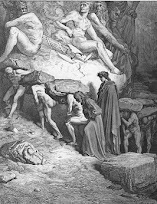On pride and vainglory
 Pride, asAquinas defines it in De Malo, is“the inordinate desire for pre-eminence” (Question 8, Article 2). WithAugustine and the Christian tradition in general, he teaches that it is “thegreatest sin” and indeed “the root and queen of all sins.” Its immediate effectis “vainglory,” which is the vice of habitually seeking to call attention toone’s own imagined excellence. And the daughters of vainglory, Aquinas tells us(Question 9, Article 3), are disobedience, boasting, hypocrisy (by whichAquinas means a tendency to magnify one’s glory by reference to “imaginarydeeds”), contention, obstinacy, discord, and what he calls the “audacity fornovelties” or predilection for bold actions that will call attention to oneselfby bringing “astonishment” to others.
Pride, asAquinas defines it in De Malo, is“the inordinate desire for pre-eminence” (Question 8, Article 2). WithAugustine and the Christian tradition in general, he teaches that it is “thegreatest sin” and indeed “the root and queen of all sins.” Its immediate effectis “vainglory,” which is the vice of habitually seeking to call attention toone’s own imagined excellence. And the daughters of vainglory, Aquinas tells us(Question 9, Article 3), are disobedience, boasting, hypocrisy (by whichAquinas means a tendency to magnify one’s glory by reference to “imaginarydeeds”), contention, obstinacy, discord, and what he calls the “audacity fornovelties” or predilection for bold actions that will call attention to oneselfby bringing “astonishment” to others.Hence themarks of a prideful and vainglorious man are an unwillingness to submit himselfto any higher authority (which would include prevailing laws and norms);habitual braggadocio and bombastic speech; exaggeration and lying about hisachievements; being obnoxiously quarrelsome; stubborn attachment to his ownopinions in the face of all evidence and superior counterarguments; and a tastefor doing things that are shocking and unexpected.
It stands toreason that a prideful and vainglorious man is bound to be polarizing. On theone hand, his fundamental motivations are to attain pre-eminence, and to do soby drawing attention to his imagined excellence. If he is good at this, thennaturally, he is going to gain a following of some kind. On the other hand,pride and vainglory are objectively ugly character traits, as the daughters ofvainglory make evident and as one would expect from the fact that pride is theworst of sins. Hence, people who see through a proud and vainglorious man’scharade are naturally going to be repulsed by him, especially if they havedecent instincts.
TheChristian tradition has, after all, held that pride is the characteristic sinof the devil and of antichrist. It isalso the characteristic sin of the tyrant, who on Plato’s analysis is aconsummate narcissist, and who in the political philosophy of Aristotle andAquinas is defined as the ruler who governs a polity for the sake of his owngood rather than for the common good. There are no villains more repulsive thanthe devil, the antichrist, and tyrants. And yet in all three cases we havefigures who draw many to them. “Satan disguises himself as an angel of light”(2 Corinthians 11:14). It is no wonder that lesser malign figures – pridefuland vainglorious politicians, business leaders, sports stars, entertainers,public intellectuals, and so on – attract many people even as they repulseothers.
Aquinas alsoteaches in De Malo that “prideextinguishes all the virtues and weakens all the powers of the soul.” It is nothard to see how this would be so. If a prideful man is by nature insubordinate,he is not likely to subordinate himself to moral restraints. He may exhibit counterfeits of certain virtues, if thatwould aid in leading others to perceive him as having excellence. He also may have a certain cleverness or cunningin achieving his ends. But it will notbe true wisdom, because that requires seeing things as they really are, and hisnarcissism prevents that. He will have allies and sycophants, but is unlikelyto have true friends, because he will ultimately sacrifice the good of others forthe sake of his own good. He may have a certain boldness, but he will not havetrue courage, because his boldness does not serve the true and the good, butonly himself. And so on.
Scripturefamously teaches that “pride goes before destruction, and a haughty spiritbefore a fall” (Proverbs 16:18). But even apart from scripture, everyone knowsthis from experience. Or almost everyone, because the prideful man himself doesnot see it. Nor do those in thrall to him, since they labor under the samedelusion about his supposed excellence as he does. It goes without saying thatthe greater the following a prideful man has, or the larger the community overwhich he has authority, the greater will be his fall, and theirs.
Edward Feser's Blog
- Edward Feser's profile
- 329 followers



